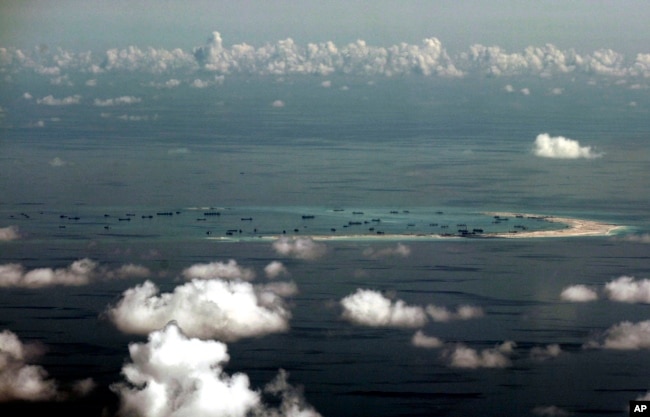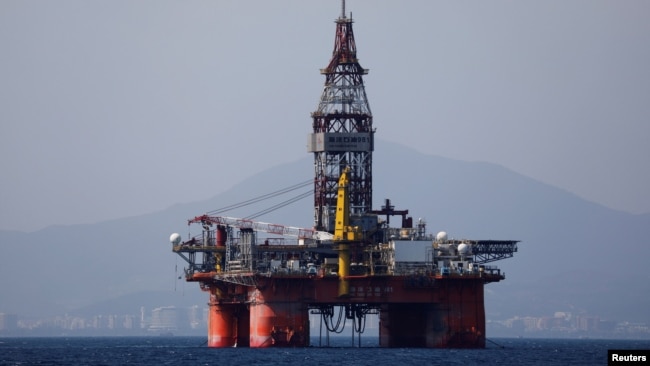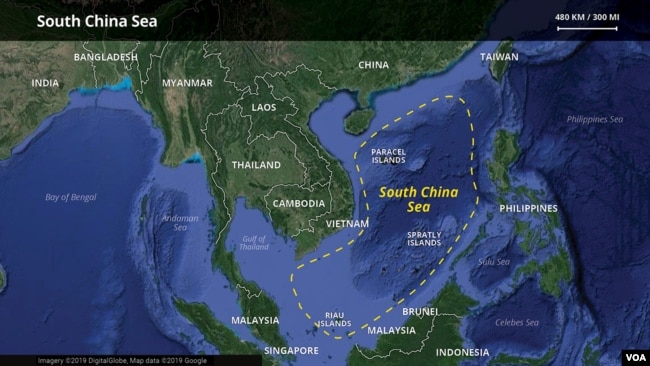南シナ海の動き
日本からだけでは見えないものがあります。
アメリカのメディアではありますが、放送倫理を信じ、今の南シナ海を見てみましょう。
今日のVOAがつたえる、主権 !!
- 制裁を受けた中国企業、南シナ海での影響力を維持する可能性が高い
- Sanctioned Chinese Company Likely to Keep Influence in South China Sea
- Words in This Story
制裁を受けた中国企業、南シナ海での影響力を維持する可能性が高い
Sanctioned Chinese Company Likely to Keep Influence in South China Sea
December 11, 2020
専門家によると、米国の制裁を受けている中国の石油会社は、経済的な制限を受けても南シナ海での影響力を維持する可能性が高いといいます。
12月3日に発効した制裁は、ホワイトハウスが11月に出した執行命令によるものです。南シナ海で活動する中国の大手石油掘削業者である中国国家海洋石油公社(CNOOOC)。
制裁では、米国市民や企業が同社の株式を取引することを禁止しています。米当局者は、石油会社が中国軍に協力しているとみて制限を命じました。CNOOCはVOAのコメント要請に答えませんでした。
ドナルド・トランプ米大統領は、制裁の目的は軍事的つながりを持つ中国企業の手の届く範囲を制限することだと述べています。
CNOOCは、同じ制裁に直面している中国企業35社のリストの中で、最初の石油・ガス会社です。同社の年間売上高は約330億ドル。米国市民はその投資家の中に含まれています。
CNOOCは紛争の多い南シナ海で石油事業を展開しています。一部の地域の専門家は、米国の制裁がこれらの操業や、中国海洋石油開発帝石の全体的な財務的な成功を妨げることはないだろうと述べています。同社の米国からの投資はわずか16%と推定されています。
CNOOCは、中国政府を含め、米国以外の資金調達先を簡単に見つけることができると専門家は言います。
アレクサンダー・ヴービング氏は、ハワイのダニエル・K・イノウエ・アジア太平洋安全保障研究センターの教授です。彼はVOAに、石油掘削機器や物資はほとんどが米国外で調達できると語っています。
CNOOCの南シナ海への関与は、350万平方キロメートルの水路における中国の影響力の延長線上にあると見られています。南シナ海では6つの政府が競って領有権を主張しています。中国は海の約90%を自国の領土として主張しており、しばしばこの地域全体に沿岸警備船を派遣しているのです。
「CNOOCは単なる企業ではなく、中国の主権争い、他国との主権争いの最前線にいる」とヴービング氏は述べています。

この月曜日、2015年5月11日のファイル写真では、軍用機のガラス窓越しに撮影されたこの航空写真は、中国が南シナ海のスプラトリー諸島にあるミスチーフ礁の埋め立てを進めているとの疑惑を示している。紛争は...
中国は、係争中の水路に小さな人工島を作ることによって、海の他の主張者を怒らせました。オブザーバーは、中国の乗組員が軍事目的のために土地のいくつかを開発したと言います。
ベトナムは、南シナ海で石油とガスを探査しているもう一つの国です。ベトナムは、この地域でのCNOOCの開発に懸念を表明しています。2014年には、中国の石油掘削業者とリンクした石油リグがベトナムの東の海域でボート衝突事件を引き起こしました。この事件をきっかけに、ベトナムでは反中暴動が起きたのです。
過去2年間、中国船がベトナムの探査海域の近くを通過することもありました。この行為はベトナム政府の批判につながったのです。
CNOOCは南シナ海でも他国との協力を模索しています。資金面での支援や技術的な専門知識の提供を求めるパートナーをターゲットにしています。例えば9月には、掘削業者は南シナ海の沖合19カ所を外国企業との共同探査に提供しました。
カール・セイヤー氏は、オーストラリアのニューサウスウェールズ大学で東南アジア研究の教授を務めています。彼はVOAに、中国とフィリピンが2年前に署名した共同探査契約の完了を目指していると語っています。「私が思うに、このフィリピンとのサービス契約は本当にどこで確定するのかということが大きな問題です。」とセイヤー氏は語っています。
米国の制裁の目的は、中国と他国との間の”契約の締結に対する圧力”だと、フィリピン大学のジェイ・バトンバカル教授は言います。しかし、もしCNOOCが停止された場合、中国はフィリピンとの探査のための別の会社をすぐに見つけることができると彼は言います。
ヴーヴィング氏は、米国の制裁は主に”威信の面”CNOOCを傷つける可能性があると考えているといいます。
この意見は中国の南シナ海国立研究所のマーク・バレンシア氏も共有しています。彼は最近のアジア・タイムズ紙の論評で、米国の制裁は CNOOC の株式価値を下げ、"会社の評判に深刻なダメージを与える "と書いています。
Sanctioned Chinese Company Likely to Keep Influence in South China Sea
 FILE - An oil platform operated by China National Offshore Oil Corporation (CNOOC) is seen in the sea off China's southernmost Hainan province, March 23, 2018.
FILE - An oil platform operated by China National Offshore Oil Corporation (CNOOC) is seen in the sea off China's southernmost Hainan province, March 23, 2018.
Experts say a Chinese oil company under U.S. sanctions is likely to keep its influence in the South China Sea even with the economic restrictions in place.
The sanctions, which took effect December 3, came from an executive order issued by the White House in November. The company is China National Offshore Oil Corporation (CNOOC), a major Chinese oil driller working in the South China sea.
The sanctions ban U.S. citizens and companies from trading the company’s shares. U.S. officials ordered the restrictions because they believe the oil company cooperates with China’s military. CNOOC did not answer a VOA request for comment.
U.S. President Donald Trump has said the goal of the sanctions is to restrict the reach of Chinese companies that have military ties.
CNOOC is the first oil and gas company on a list of 35 Chinese companies facing the same sanctions. The company has yearly sales of about $33 billion. U.S. citizens are among its investors.
CNOOC has active oil operations in the disputed South China sea. Some area experts say the U.S. sanctions will not interfere with these operations, nor with CNOOC’s overall financial success. The company’s American investment is estimated to be just 16 percent.
CNOOC can easily find other non-U.S. sources for financing, including possibly the Chinese government, the experts say.
Alexander Vuving is a professor at the Daniel K. Inouye Asia-Pacific Center for Security Studies in Hawaii. He told VOA that oil drilling equipment and supplies can largely be found outside the United States.
CNOOC’s involvement in the South China Sea is seen as an extension of China’s influence in the 3.5 million-square-kilometer waterway. Six governments have competing claims in the South China Sea. China claims about 90 percent of the sea as its territory and often sends coast guard ships throughout the area.
“CNOOC is not just a company, but it’s also on the forefront of China’s sovereignty struggles, sovereignty combat, against the other countries,” Vuving said.
China has angered other claimants to the sea by creating small artificial islands in the disputed waterway. Observers say Chinese crews have developed some of the land for military purposes.
Vietnam is another country exploring oil and gas in the South China Sea. It has expressed concerns about CNOOC’s development in the area. In 2014, an oil rig linked to the Chinese driller led to a boat-crashing incident in waters east of Vietnam. The incident led to anti-China rioting in Vietnam.
Over the past two years, Chinese ships have also passed near Vietnamese exploration areas. The actions led to criticism by Vietnam’s government.
CNOOC is seeking to cooperate with other countries in the South China Sea as well. The company is targeting partners looking to receive financial support and technical expertise. In September, for example, the driller offered 19 offshore areas in the South China Sea for joint exploration with foreign companies.
Carl Thayer is a professor of Southeast Asian studies at the University of New South Wales in Australia. He told VOA that China and the Philippines are seeking to complete a joint exploration deal signed two years ago. “The big deal I think is really where does this service contract with the Philippines get finalized,” Thayer said.
The goal of the U.S. sanctions is to “pressure against awarding contracts” between China and other countries, said Jay Batongbacal, a professor at the University of the Philippines. But if CNOOC is stopped, he said, China can quickly find another company for exploration with the Philippines.
Vuving said he thinks the U.S. sanctions could hurt CNOOC mainly “in terms of prestige.”
That opinion is shared by Mark Valencia, of China’s National Institute for South China Sea Studies. He wrote in a recent Asia Times commentary the U.S. sanctions could reduce CNOOC’s stock value and “severely damage the company’s reputation.”
_______________________________________________________________
Words in This Story
sanctions – n. an action that is taken or an order that is given to force a country to obey international laws by limiting or stopping trade with that country, by not allowing economic aid for that country
driller – n. a tool used for making holes
forefront – n. the most important part or position
sovereignty – n. unlimited power over a country, a country's independent authority and the right to govern itself
artificial – n. not happening or existing naturally, created or caused by people
rig – n. equipment or machinery that is used for a particular purpose
contract – n. a legal agreement between people or companies
prestige – n. the respect and admiration that someone or something gets for being successful or important
reputation – n. the common opinion that people have about someone or something
